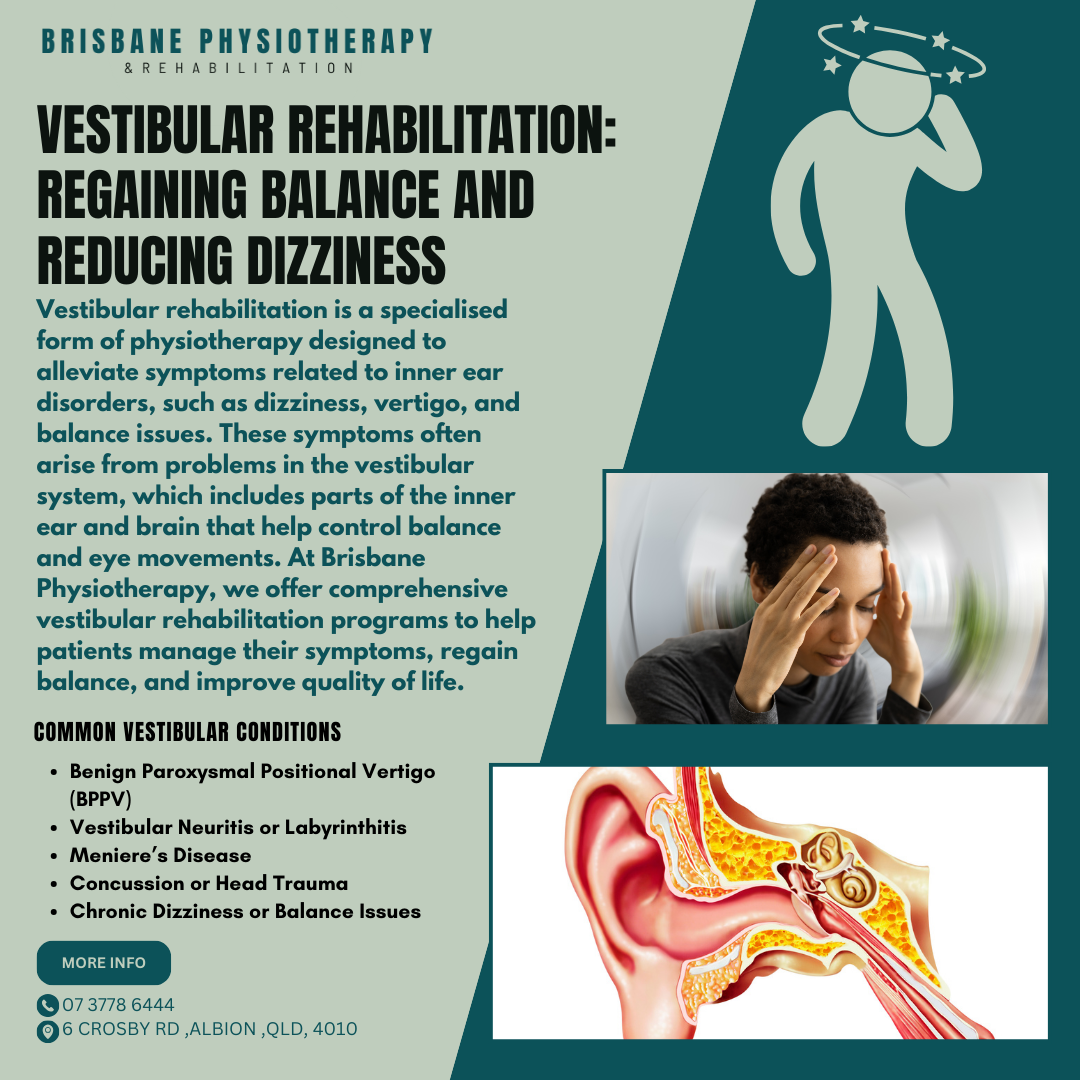
Our Services
Vestibular Treatment for Vertigo and Dizziness
Vestibular rehabilitation is a specialised form of physiotherapy designed to alleviate symptoms related to inner ear disorders, such as dizziness, vertigo, and balance issues. These symptoms often arise from problems in the vestibular system, which includes parts of the inner ear and brain that help control balance and eye movements. At Brisbane Physiotherapy, we offer comprehensive vestibular rehabilitation programs to help patients manage their symptoms, regain balance, and improve quality of life.
What is Vestibular Rehabilitation?
Vestibular rehabilitation involves a series of treatments and exercises tailored to each patient’s specific condition. The aim is to reduce dizziness, improve balance, and stabilise vision through conservative and gentle treatments. This type of rehabilitation can be beneficial for people with various conditions
Why choose Brisbane Physiotherapy?
At Brisbane Physiotherapy, our trained therapists have experience in vestibular rehabilitation and understand the complexities of vestibular disorders. We provide individualised treatment plans that are specifically tailored to your symptoms and goals. Our approach is hands-on, with a focus on gradual progress to ensure the best possible outcomes for our patients.
Contact us today to book an assessment and start your journey to better health.
Common Conditions We Treat
Benign Paroxysmal Positional Vertigo (BPPV): A common cause of dizziness triggered by specific head movements.
Vestibular Neuritis or Labyrinthitis: Inflammation of the inner ear causing sudden onset vertigo and imbalance.
Meniere’s Disease: An inner ear disorder characterised by episodes of vertigo, tinnitus, and hearing loss.
Concussion or Head Trauma: Damage to the brain or inner ear can lead to vestibular dysfunction and balance problems.
Chronic Dizziness or Balance Issues: Some individuals experience persistent dizziness or unsteadiness, which can often be helped with a tailored vestibular rehabilitation program.
How Does Vestibular Rehabilitation Work?
Vestibular rehabilitation typically involves three main types of exercises:
Habituation Exercises: These involve repeated exposure to movements or visual stimuli that provoke dizziness, helping the brain gradually adapt to these triggers and reduce symptoms over time.
Gaze Stabilisation Exercises: These exercises help improve control of eye movements, especially when the head is moving, which is vital for maintaining clear vision and preventing dizziness.
Balance Training: Balance exercises aim to improve stability and coordination, enhancing the patient’s ability to perform daily activities safely.
What is Benign Paroxysmal Positional Vertigo (BPPV)?
BPPV is a disorder of the inner ear that manifests as brief episodes of vertigo, often triggered by specific head movements. It occurs when tiny calcium crystals called otoconia dislodge from their usual position in the inner ear and enter the semicircular canals, which are responsible for detecting rotational movements. This displacement leads to a mismatch between the signals your brain receives from the inner ear and your actual body position, causing dizziness and disorientation.
Symptoms of BPPV
Individuals with BPPV may experience a range of symptoms, including:
Dizziness
Vertigo (a spinning sensation)
Lightheadedness
Unsteadiness
Nausea
These symptoms are typically triggered by movements such as rolling over in bed, tilting the head back, or looking up.
Diagnosis and Treatment
Diagnosing BPPV often involves a thorough physical examination, including specific positional tests performed by a healthcare professional. Once diagnosed, there are effective treatment options available, many of which fall within the realm of physiotherapy.
Physiotherapy Interventions
Physiotherapy plays a crucial role in managing BPPV and helping patients regain their balance and stability.
Find out more about our treatment modalities:
Book a Pre/Post Natal appointment at our West End clinic here:

